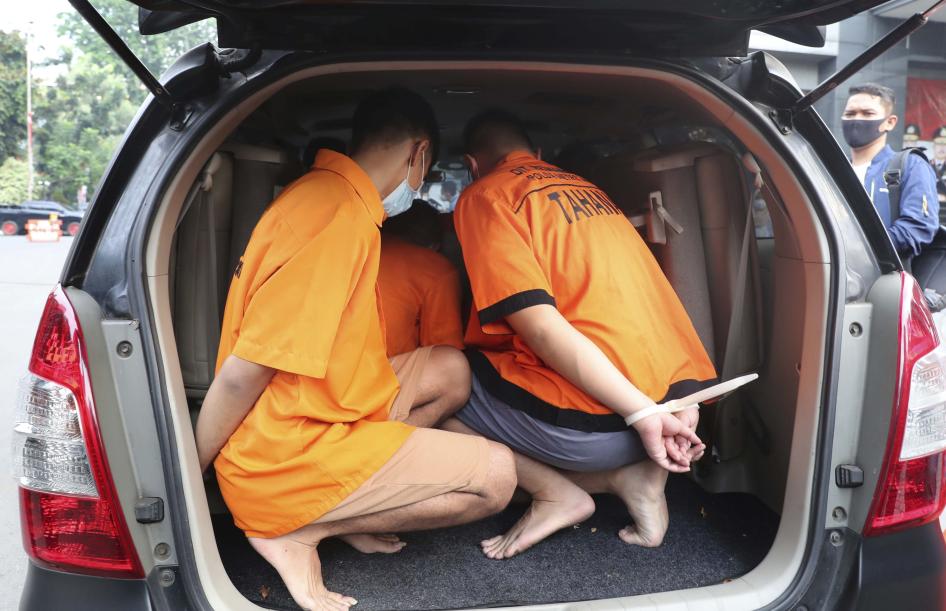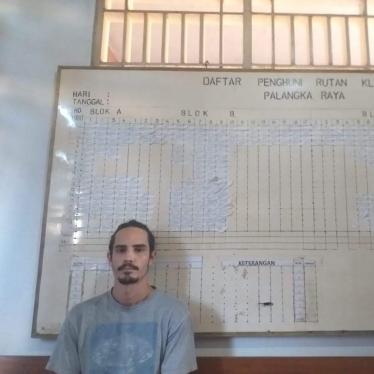(New York) – The Indonesian government should urgently investigate a police raid on a private gathering of 56 men in Jakarta that highlights the threat to the rights of lesbian, gay, bisexual, and transgender (LGBT) people in the country, Human Rights Watch said today. On August 29, 2020, police forcibly broke up a party at a hotel, arresting nine men and charging them with the crime of “facilitating obscene acts” and under the pornography law, which discriminates against LGBT people.
The charges violate the rights to privacy, association, and equal protection of the law and should immediately be dropped.
“This latest raid fits into a disturbing pattern of Indonesian authorities using the pornography law as a weapon to target LGBT people,” said Kyle Knight, senior LGBT rights researcher at Human Rights Watch. “The government has been inciting hostility toward LGBT people for several years, and there is no accountability for abuses such as police raids on private spaces.”
Article 296 of Indonesia’s criminal code makes it a crime for someone to make “an occupation or a habit of intentionally causing or facilitating any obscene act by others.” The maximum penalty is 16 months in prison.
The Jakarta raid is part of a years-long pattern of authorities unlawfully apprehending LGBT people in private spaces. Indonesia’s central government has never criminalized same-sex behavior, but no national laws specifically protect LGBT people against discrimination. An uptick in anti-LGBT rhetoric and attacks since 2016 has resulted in the application of discriminatory clauses in the pornography law to target LGBT people for arrest and prosecution.
Indonesia’s 2008 Law on Pornography prohibits the “creation, dissemination or broadcasting of pornography containing deviant sexual intercourse,” which it defines to include: sex with corpses, sex with animals, oral sex, anal sex, lesbian sex, and male homosexual sex. Article 36 of the Pornography Law, which criminalizes facilitating obscene acts for a commercial purpose, has a maximum penalty of 10 years in prison.
A group of activists, including LGBT organizations, attempted to challenge the law in the Constitutional Court in 2009, but the court declined to review it.
While historically the law was not used to target LGBT people specifically, in recent years police have used it as a pretext for arbitrary raids and arrests, and courts have found gay men in private gatherings guilty under the law.
In September 2017, a court in Surabaya found seven men who had been arrested during a police raid on a gay party in April of that year guilty under the pornography law and sentenced them to between 18 months and 30 months in prison.
In October 2017, Jakarta police raided a club popular with gay men, arresting 58 people. Police released most of them the same day but detained five employees of the club – four men and a woman – and threatened to charge them with violating the pornography law. They were subsequently released without charge.
On December 15, 2017, the North Jakarta District Court sentenced 10 men to between two and three years in prison for violating the pornography law. Police had apprehended the 10, along with 131 others, during a raid on the Atlantis Gym, a sauna frequented by gay men in Jakarta, in May 2017. The 10 were convicted based on allegations that they were naked at the time of the raid, citing the law’s prohibition on performances that involve stripping.
In January 2018, police in Cianjur, West Java province, raided a private home where five men had gathered. Citing the pornography law, the police told reporters the men were caught at a “sex party,” using condoms and lubricant as evidence.
In a development similar to the application of the pornography law, in January 2020, the mayor of Depok, a city in West Java, ordered police to raid private residences to look for “immoral acts” and “prevent the spread of LGBT.” The National Human Rights Commission (Komnas HAM) condemned the order, saying such rhetoric from public officials increases the risk of persecution of LGBT people.
According to the police report of the recent Jakarta raid, a 31-officer police unit, under Adjunct Police Commissionaire Jerry Raimond Siagian, had apparently been monitoring the private gathering and organized the raid.
Privacy rights are a fundamental protection that underlie everyone’s physical autonomy and identity and include protections for private adult consensual sexual behavior, Human Rights Watch said. The United Nations Human Rights Committee, the independent body of experts that interprets the International Covenant on Civil and Political Rights (ICCPR), to which Indonesia is party, has stated, “It is undisputed that adult consensual sexual activity in private is covered by the concept of ‘privacy.’”
Indonesia has been a champion for privacy rights internationally, co-sponsoring a UN Human Rights Council resolution on the right to privacy. In the report on that resolution, the Office of the UN High Commissioner for Human Rights reminded governments that privacy rights (enshrined in ICCPR article 17) should be upheld jointly with the right to nondiscrimination (ICCPR, article 26).
Indonesian police should halt arbitrary raids on private spaces, investigate those that have taken place, and punish those who took part in the raids and those responsible in their chain of command, Human Rights Watch said. President Joko “Jokowi” Widodo, who has voiced support for LGBT Indonesians in the past, should make clear the prohibition against discriminatory behavior by the police.
The Indonesian parliament should also substantially revise the proposed new criminal code to meet international human rights standards. It contains articles that will violate the rights of LGBT people. It has provisions that will punish extramarital sex by up to one year in jail. While this article does not specifically mention same-sex conduct, since same-sex relationships are not legally recognized in Indonesia, this provision effectively criminalizes all same-sex conduct.
“The combination of exploiting the discriminatory pornography law and a lack of accountability for police misconduct has proved to be both dangerous and durable,” Knight said. “So long as the government permits police raids on private gatherings under a discriminatory law, it will fail to curb anti-LGBT harassment and intimidation.”
Indonesia: Investigate Police Raid on ‘Gay Party’
Authorities Exploiting Pornography Law to Target LGBT People
Your tax deductible gift can help stop human rights violations and save lives around the world.
Topic
Most Viewed
-
June 24, 2022
Q&A: Access to Abortion is a Human Right

-
April 27, 2021
A Threshold Crossed

-
April 17, 2024
West Bank: Israel Responsible for Rising Settler Violence

-
June 21, 2017
“Just Let Us Be”

-
September 3, 2019
“Don’t Punish Me for Who I Am”





